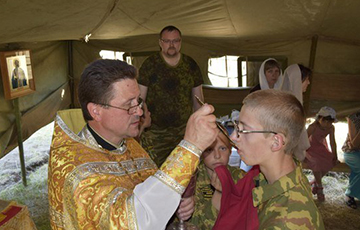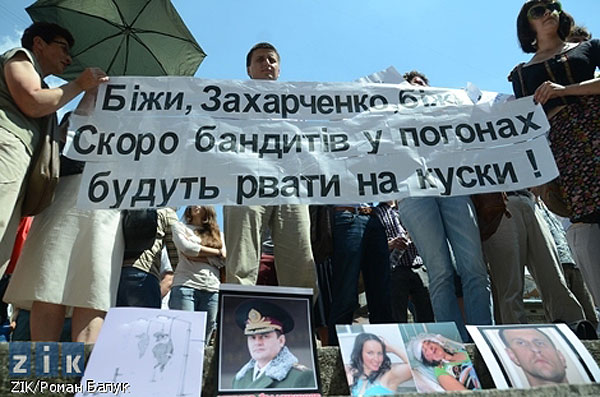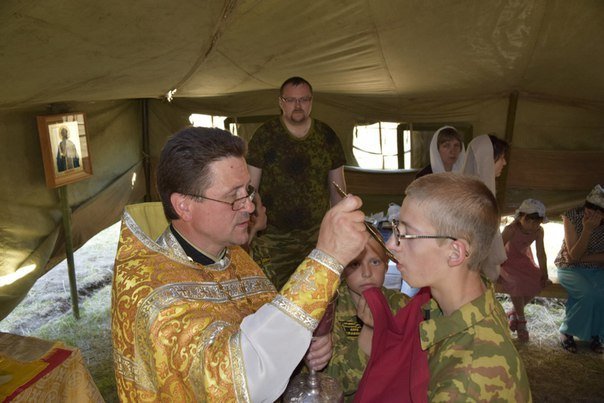Russia Follows the Policy against Belarus Practiced Before the Annexation of Crimea
27- 7.12.2016, 10:25
- 33,330

There are five examples of how today's Belarus is analogous to Ukraine.
Statement of Minister of Internal Affairs Ihar Shunevich on how "colored revolutions" start recalls about words of former Minister of Internal Affairs of Ukraine Vitaly Zakharchenko voiced in first weeks of confrontation in Kyiv:
- The detailed analysis and monitoring of mass media prove that the information propaganda with the use of biased and damaged has been recently launched against the Ministry of Internal Affairs.
This is not the only similarity in biography of two ministers. Moreover, this is one of the parallels in the history of the Belarusians and the Ukrainians. Salidarnasts put up together five examples of how today's Belarus is analogous to Ukraine.
The Way Ukrainians and Belarusians clamored against Ministers of MVD
On the night of June 26 to 27, 2013 three men severely beat, raped and tried to kill a local woman in Vravyivka village, Mykolaiv region. Soon it became known that two men were from the local police office. Furious villagers stormed the police office and made arrest the suspects.
That scandal rose the wave of protests across the country. Participants of march to Kyiv clamored against Zakharchenko. But he refused it and declared full-fledged reforms in the department.

A year later Belarusian police officers were informed about lessons learned in Vravyivka village, because they got involved in scandals more often. A year passed, but the number of scandals with police officers has not decreased. The society attempted to clamor against the minister of Internal Affairs. The first attempt was made in April, the new signatures collection was launched in November on change.org. Their initiators believe that Ihar Shunevich is not able to cope with his duties.
The Way Russia Stopped Ukrainian Import
on August 14, 2013 the Federal Customs Service of Russia suspended import of all Ukrainian goods and marked them as "hazardous". Meanwhile, Ukraine exported about a quarter of its goods to Russia.
Editor-at-large of the Russian version of Forbes designated Moscow's desire to show Kyiv what would happen in case of the Western way of development as the cause.
It will be recalled that a few months left before the signing of the Ukrainian Association and Free-Trade Zone Agreement with the EU. In the result, then President of Ukraine Viktor Yanukovich did not sign the agreement, which can be mostly explained with economic blackmail of Russia. And we all know what happened later.
The history of trade wars of Belarus and Russia has had no precedents yet, but don't get relaxed - Russia-Ukraine trade dispute started with "detention" of benzopyrene in Roshen chocolate.
The latest tendencies raise concerns. Starting from separate actions on import ban of some products to common accusations. The new example: Sergey Dankvert, head of the Federal Service for Veterinary and Phytosanitary Surveillance, accused Belarusians of poisoning of Russian citizens:
- It is hard to compete with the Belarusian production, it is cheaper including cases with goods delivered with forged documentation. Of course, liver and kidneys can operate for long, one may not think over it. After all, this is not arsenic.
The Russian media accuse Belarusians of growing milk prices.
The Story about the "Bad" Crimea before 2014 Year
It is hard to believe in, but a few years before the annexation of the Crimea the Russian propaganda was not loath to issue chills about risks of relax on the peninsula. For example, in 2011 NTV TV showed video of Crimea shore flooded with hundreds of barrels with chemical weapons in the aftermath of World War II.
"Crimea is followed by Egypt and Tunis among the most hazardous places of resort for the Russians," the TV channel frightened their viewers, and two years later it turned it into a real information warfare along with its colleagues.
We are got acquainted with a media war with Russia as well. Recent events prove that accusations against the Belarusians, not only against Aliaksandr Lukashenka, are voiced. We are accused of attempts to face the West, increase of Russophobia and nationalism.
The Story about where Occupants of Slavyansk Hid
In the spring of 2014 years an armed group of mercenaries headed by Russian citizen Igor Girkin (Strelkov) occupied Slavyansk (Donetsk region). Later in court former mayor Nelya Shtepa stated that about a thousand people had participated in the attack. About a quarter of them sheltered in the territory of the Holy Mountains Lavra before the attack. Locals also informed about the base of pro-Russian mercenaries in the territory of the Lavra.
One of heads of separatists Pavel Gubarev writes in his book about the Donbas that Girkin together with his squad stayed at senior priest's of the church, famous for his pro-Russian views, on the eve of attack on administrative buildings of Slavyansk.

This is only a few cases of possible involvement of priests of the Moscow Patriarchate in the conflict in Ukraine. But we will recall the case when Belarusian children were sent to Russian neo nazi training camps with involvement of the Diocese of Vitsebsk, as well as doubtful "military and patriotic" clubs created with participation of the Orthodox Church in the Hrodna region.










